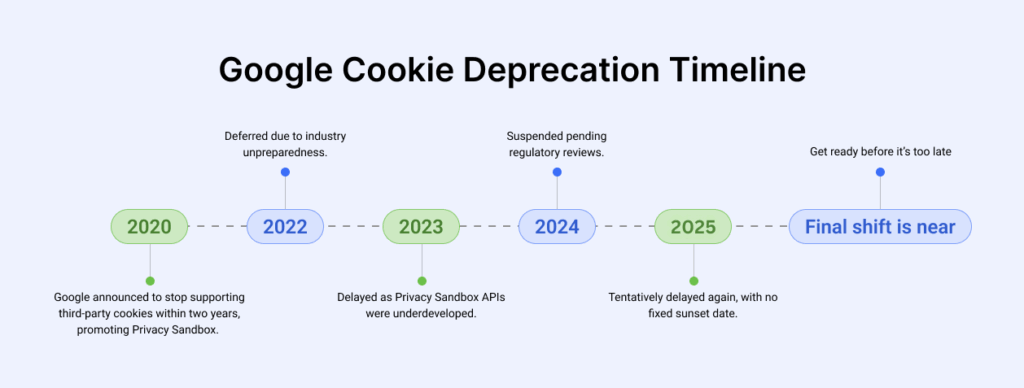Have you been wondering what’s happening with Google cookie deprecation? Or how cookie deprecation will affect advertising and your business’s digital strategy? With all the delays and uncertainty, it’s a fair question.
This blog covers everything you need to know about Google cookie deprecation: what it is, why it’s delayed, how third-party cookie deprecation affects advertising, what’s replacing cookies, and how businesses can prepare using smarter, privacy-first tools. Continue reading!
Cookie deprecation refers to the process of phasing out third-party cookies from browsers. These cookies are traditionally used for tracking users across websites for ad targeting, personalisation, and analytics.
The term receive-cookie-deprecation has gained traction in developer and ad-tech circles to signal the planned discontinuation of third-party cookie support in major browsers, especially Google Chrome.
Chrome holds over 60% of the global browser market share. When Google Chrome cookie deprecation is complete, it will mark the largest shift in digital advertising in decades. The effects will ripple through every ad exchange, marketing funnel, and analytics system.

Google announced in early 2020 that Chrome would stop supporting third-party cookies within two years. The intent was to promote a more privacy-centric web through the Privacy Sandbox initiative.
Google’s initial timeline for cookie deprecation seemed aggressive, but delays followed due to industry pushback and readiness gaps:
These repeated extensions reflect the complexity of replacing 3rd party cookies.
The UK’s Competition and Markets Authority (CMA) and the US Federal Trade Commission (FTC) are both evaluating the impact of Google’s third-party cookie deprecation on competition. Chrome’s delay is conditional on meeting CMA’s commitments.
The Privacy Sandbox proposes a set of APIs to replace 3rd party cookie deprecation functionalities:
These tools are designed to offer privacy-safe targeting, but with limited granularity compared to traditional cookies.
While Google’s Privacy Sandbox APIs have gained significant attention, they’re not the only players in the race to replace third-party cookies. As cookie deprecation advertising takes hold, the ecosystem is rapidly evolving with other innovative solutions entering the scene.
Below are emerging technologies that are gaining traction across adtech, analytics, and consent management in the wake of Google’s third-party cookie deprecation:
These innovations reflect the industry’s urgent shift toward more resilient, privacy-first marketing frameworks in response to Google Chrome cookie deprecation.
The current digital ad infrastructure has long relied on third-party cookies for precision, personalisation, and cross-site measurement. These cookies enable:
The Privacy Sandbox’s proposed APIs are still in limited testing phases. Their ability to replace cookie functionality at scale is not yet proven.
Early tests show Sandbox tools reduce targeting accuracy and increase campaign inefficiencies. Smaller advertisers and publishers are concerned about losing competitive footing.
Global watchdogs are concerned that Google’s replacement tools will consolidate its ad dominance rather than promote fair competition. Until these concerns are resolved, Google cookie deprecation remains on hold.
With third-party cookie deprecation accelerating, digital advertising is undergoing a major transformation. Businesses must rethink strategies to stay effective and compliant.
Here’s how third-party cookie deprecation impacts the current ad ecosystem:
To remain competitive, businesses must adopt privacy-centric alternatives that ensure continuity, personalisation, and performance in a cookie-free environment.
As 3rd party cookie deprecation reshapes digital advertising, businesses must pivot fast to maintain relevance, targeting precision, and performance. Leading alternatives include:
These workarounds are becoming essential—not optional—in the era of Google cookie deprecation and privacy-first marketing.
A March 2025 Digiday report reveals that more than 70% of digital marketers feel “underprepared” for the shifting realities of cookie deprecation advertising. This anxiety is especially high around performance marketing, where third-party cookies have long powered ROI tracking and ad delivery.
Many businesses worry about reduced ad relevance, targeting inefficiencies, and sharp revenue dips, particularly across mobile and programmatic display channels. As Google cookie deprecation progresses, advertisers are racing to adapt strategies in real time, often with incomplete data and limited technical resources.
As cookie deprecation accelerates, businesses can no longer rely on third-party data to track, target, or convert users. The shift to first-party data is not just a recommendation—it’s a requirement. Brands must act now to build direct relationships with users and gain consent through transparent, privacy-safe methods.
To navigate this shift, businesses should:
These steps help replace the lost value of third-party cookie deprecation while building a trusted user experience that aligns with new privacy norms.
With Google cookie deprecation and evolving regulations, the ad ecosystem must evolve toward methods that don’t rely on invasive tracking. Businesses need smarter, AI-driven tactics that respect privacy while retaining marketing effectiveness.
Leading alternatives include:
By shifting toward these strategies, businesses can stay competitive in a landscape shaped by cookie deprecation, advertising and data regulation reform.
The receive-cookie-deprecation trend aligns with stricter privacy laws like GDPR, CCPA, and the UK DUA Bill. Businesses must adopt robust consent management to remain compliant, competitive, and audit-ready.
Despite recurring delays, Google has reiterated its commitment to third-party cookie deprecation. Chrome is the last major browser to support them—Safari and Firefox began blocking third-party cookies years ago.
Key factors to watch:
Businesses should treat cookie deprecation not as a distant threat, but as an active shift already reshaping the adtech and compliance landscape. Every delay is a temporary window, not a cancellation.
Brands that start adapting now—by investing in privacy-safe tools, building stronger consent strategies, and testing alternative ID solutions—will be the ones that thrive when the final switch is flipped. There’s still time, but it’s running out.
Seers AI empowers your business to thrive beyond third-party cookie deprecation with AI-driven consent, tracking, and compliance tools—without sacrificing performance or privacy. Contact us today and future-proof your advertising strategy before the next shift hits.
Start Free NowThird-party cookie deprecation refers to browsers phasing out tracking cookies used across websites for advertising and analytics. This shift is driven by privacy concerns, regulatory pressure, and user demand for greater control over personal data. It marks a major change in how digital advertising works.
Advertisers will lose access to traditional user-level tracking across sites, affecting audience targeting, attribution models, and ad performance metrics. As Google’s third-party cookie deprecation advances, marketers must adopt privacy-friendly alternatives like first-party data, contextual targeting, and identity solutions to maintain ad relevance and ROI.
Delays stem from technical limitations of replacement tools, advertiser readiness, and regulatory scrutiny. Google’s Privacy Sandbox is still in development, and concerns remain over competition and effectiveness. The timeline now depends on proving that alternatives can match cookies without harming the digital ad ecosystem.
Google Chrome cookie deprecation will be followed by new APIs like Topics, Protected Audience, and Attribution Reporting from the Privacy Sandbox. Additionally, the industry is moving toward first-party data, Universal IDs, and server-side tagging—all offering privacy-safe ways to target, personalise, and measure ads.
“Receive-cookie-deprecation” is a technical flag or signal in browser updates and development tools. It alerts developers to prepare for the removal of third-party cookie support by testing new APIs and shifting to privacy-first data collection methods to ensure the ongoing functionality of adtech and analytics solutions.
Businesses must prioritise building strong first-party data strategies, implementing privacy-compliant consent tools, and testing new targeting methods. As cookie deprecation advertising reshapes digital marketing, brands that adapt early with contextual ads and AI-driven personalisation will be better positioned to compete in the new ecosystem.


United Kingdom
24 Holborn Viaduct
London, EC1A 2BN
Get our monthly newsletter with insightful blogs and industry news
By clicking “Subcribe” I agree Terms and Conditions

Seers Group © 2026 All Rights Reserved
Terms of use | Privacy policy | Cookie Policy | Sitemap | Do Not Sell or Share My Personal Information.